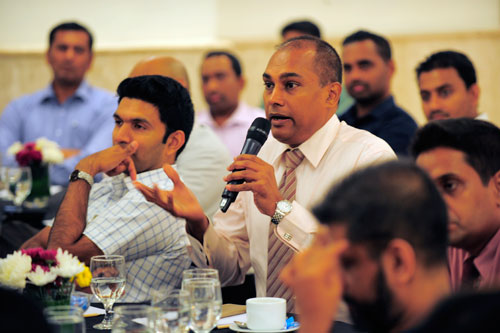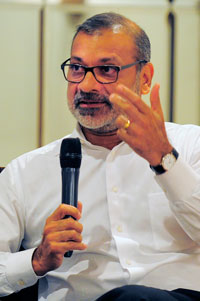Lankan education system, government jobs kill entrepreneurship

STBC member Nishan K.Silva asks a question.
While Sri Lanka’s start-ups and millennial entrepreneurs are facing a massive challenge in sustaining the industry, the root cause is the country’s education system and government jobs, say some industry experts.
 On Wednesday the Business Club of the Sunday Times (STBC) organised a panel discussion on ‘Startups-The Age of Entrepreneurship’ at the Kingsbury Hotel in Colombo. Four industry experts -John Keells Holdings Deputy Chairman and PickMe Chairman, Ajit Gunewardene, takas.lk co-founder and CEO, Lahiru Pathmalal, wow.lk and SLIIT co-founder and Director, Thilan Wijesinghe and Calcey Tehnologies founder and CEO, Mangala Karunaratne were the panellists at the discussion.
On Wednesday the Business Club of the Sunday Times (STBC) organised a panel discussion on ‘Startups-The Age of Entrepreneurship’ at the Kingsbury Hotel in Colombo. Four industry experts -John Keells Holdings Deputy Chairman and PickMe Chairman, Ajit Gunewardene, takas.lk co-founder and CEO, Lahiru Pathmalal, wow.lk and SLIIT co-founder and Director, Thilan Wijesinghe and Calcey Tehnologies founder and CEO, Mangala Karunaratne were the panellists at the discussion.
 During the discussion Mr. Wijesinghe stressed, “The killer of entrepreneurship in Sri Lanka is the poor education system and government jobs.” This is the root cause for the start-ups to become unsuccessful and find it difficult to sustain in the industry, he added.
During the discussion Mr. Wijesinghe stressed, “The killer of entrepreneurship in Sri Lanka is the poor education system and government jobs.” This is the root cause for the start-ups to become unsuccessful and find it difficult to sustain in the industry, he added.
Mr. Gunewardene at the beginning of the discussion stated that youngsters struggle at the initial stages to set up a start-up mainly due to several reasons like lack of business experience, executing the business plan and raising capital expenditure. For a tech start-up company, a clear execution plan is critical and you need to have the sources of funding in flow and have the Key Performance Indicators (KPI) in place.

Lahiru

Mangala
Adding to that Mr. Pathmalal said, “Today the ecosystem has developed to a tremendous degree since 2012. We have been advocating the government to help start-ups to grow and change the mindset of the people. You have to take risks in terms of cost.”
Businesses start with mentoring and cross border association. In start-ups, growth of the company is measured monthly and not annually unlike in big corporate companies, pointed out Mr. Wijesinghe. “As start-ups you need to focus on how to merge the people with the capital investment. Today with mobile phone penetration, even small businesses are growing tremendously,” he added.
Mr. Karunaratne noted that you need to have the passion to begin and run a start-up. Disruption is happening vigorously worldwide and it will continue throughout.
Looking at the Sri Lankan start-up industry 10 years ahead, Mr. Gunewardene said, “The start-up ecosystem we are in today is not something we predicted 10 years ago and it will be something unpredictable 10 years ahead.” Start-ups that can adapt to the environment amidst disruption from other startups will survive and the rest will perish,” he noted.
Answering the same question Mr. Pathmalal responded, “The country needs to move into efficient ways to get things done in another 10 years while consumer competence is considered important. We need to build a knowledge-based economy.”
The state should provide the tools and equal opportunities to people in the IT and e-commerce sector. Sri Lanka is one of the most inefficient and least productive countries in the world at the moment. The challenge is not how you create the product, but to identify the pitfalls in solving the issues, noted Mr. Wijesinghe.

Ajit

Thilan Pix by Amila Gamage
Responding to questions from the audience, Mr. Gunewardene mentioned that amongst start-ups, technology levels the playing field. “Not all businesses are risk involved but there are businesses that are adaptable to Sri Lanka. You need to look at the future size of the market. Since capital is what is required to begin a start-up the private sector has to step in, there is no point looking at what the government will do,” he noted.
Adding to that Mr. Pathmalal expressed that all factors affecting a business are internal and nothing is external. Start-up investors are taking a risk in order to run the company, but when the government applies various taxes at different stages its frustrating. “The government needs to create the tools to foster an enabling environment. We need to advocate the things we believe in. If start-ups are to succeed we need everyone to change their mindset with time.”
Look for loopholes when going forward. Ideas can be worthless but you need to think out of the box. You can wait for the government to do things but better do it by yourself. As work ethics, people need to work hard to become successful, noted Mr. Karunaratne.
Mr. Gunewardene also pointed out that start-ups should not get into Corporate Social Responsibility activities. Investing in start-ups is one way of attracting talent. Lots of technology companies fund start-ups in foreign countries where it shouldn’t be a charitable exercise. “We are entering an era where pretty interesting things are about to take place on one hand while it’s also frightening on the other hand. New businesses will be created and prevailing ones might perish. It’s a period of significant change.”
“Competitive advantage is our people, since Sri Lankans are very talented. The perception of corporate heads needs to change and foster diversity. Sri Lanka needs to get rid of the barriers and move forward,” noted Mr. Wijesinghe.


